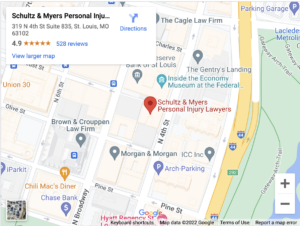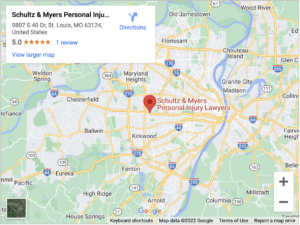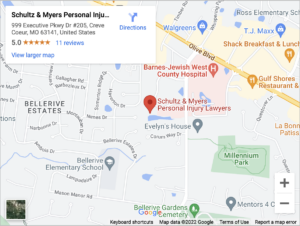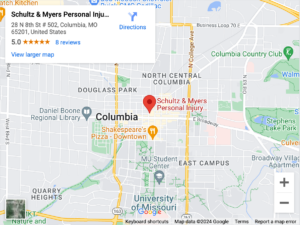
A court will award you compensatory damages if you win a personal injury lawsuit. As the name implies, compensatory damages are designed to compensate you for what you lost due to your injuries—medical bills, lost earnings, pain and suffering, etc. In some cases, however, a court will also award punitive damages.
Punitive Damages vs. Compensatory Damages
The purpose of punitive damages is to punish the defendant for unacceptable behavior, not to compensate you. Nevertheless, the money still goes to you. Victorious personal injury claimants win compensatory damages but not necessarily punitive damages. However, it is almost impossible to win punitive damages without also winning compensatory damages.
When a court awards them, punishment damages are always a supplement to compensatory damages, not a substitute. Courts only occasionally award punitive damages, even when the defendant’s liability is clear.
The Legal Elements of a Punitive Damages Claim
Under the Missouri punitive damages statute, you must prove that the defendant “intentionally harmed the plaintiff without just cause, or acted with a deliberate and flagrant disregard for the safety of others.” The standard of proof is ”clear and convincing evidence.”
What Is “Clear and Convincing Evidence”?
“Clear and convincing evidence” is a standard of proof that is considerably more difficult to meet than the “preponderance of the evidence” standard of proof that applies to compensatory damages.
Under the preponderance of the evidence standard, you must prove your entitlement to compensatory damages by a “more likely than not” standard (a 51% likelihood, for example). Under the clear and convincing evidence standard, you must prove that you are much more likely than not to qualify for punitive damages.
However, the “clear and convincing evidence” standard is still easier to meet than the “beyond a reasonable doubt” standard that applies to criminal prosecutions.
Punitive Damages in Settlement Negotiations
You are likely to find it extremely difficult to convince the opposing party to agree to pay punitive damages. In many punitive damages cases, the defendant acted intentionally, not negligently.
Insurance policies generally exclude coverage for intentional misconduct. Even a court award of punitive damages against the defendant cannot change this limitation. Consequently, you have little leverage in settlement negotiations with an insurance company regarding punitive damages. Insurance policy ceilings also limit the amount of money an insurance company will pay.
Punitive Damages and Settlement Negotiations With Wealthy Defendants
Not all settlement negotiations take place between injured victims and insurance companies. Sometimes, the responsible party is a business or a wealthy individual.
Under these circumstances, you have a better chance of negotiating punitive damages. The defendant might agree to pay punitive damages out of fear that a “runaway jury” might award you even more money if your case goes to trial.
Pleading Punitive Damages: Missouri’s Special Rules
Missouri law is hostile to punitive damages. It imposes obstacles that you might not face in other states. One of these obstacles is the procedure involved in pleading punitive damages. To get the question of punitive damages before a jury, you must:
- Ask the court for permission to file a special motion asking for punitive damages. Your request must take place at least 120 days before the trial date or the final pretrial conference.
- The court will grant or deny your request, depending on the judge’s opinion on whether a reasonable jury could award punitive damages in your case.
- If the court agrees to allow you to ask for punitive damages, you must file a written pleading to demand them. The pleading must include supporting evidence.
- You cannot seek punitive damages based on the defendant’s harm against nonparties.
You cannot ask for punitive damages in your initial complaint that commences the lawsuit.
Special Case: Workers’ Compensation Claims
You cannot take a workers’ compensation claim to court, and you cannot win punitive damages for a workers’ compensation claim. If you are an employee injured on the job, there are cases when you might take a third party (other than your employer) to court and seek punitive damages. If your claim is against your employer, however, you will be stuck inside the workers’ compensation system, where punitive damages are forbidden.
Special Case: “Respondeat Superior” Claims Against Employers
Under the time-honored legal doctrine of respondeat superior, you can sometimes hold an employer liable for damages caused by their employer’s misconduct. Theoretically, this doctrine applies to both compensatory and punitive damages. The Missouri state legislature, however, has erected obstacles to winning punitive damages against an employer for employee misconduct.
If you claim against an employer, you can qualify for punitive damages under the following circumstances:
- The owner or manager of the establishment authorized both the employee’s offending action and how it was done;
- The employer negligently hired the employee (by hiring a driver with multiple DUIs without checking their driving record, for example);
- The employee was a manager and was acting within the scope of their employment when they committed the offending act; or
- An owner or manager ratified the offending act.
As discussed, punitive damages in Missouri are relatively rare, even compared to other states.
Examples of Actions That Might Trigger Punitive Damages Liability
The following acts might justify a claim of punitive damages:
- DUI accidents;
- Assault and battery;
- Sexual assault;
- A road rage incident where the defendant deliberately caused your vehicle to crash; or
- The defendant “sicced” their dog on you.
Many other circumstances might justify punitive damages. Nevertheless, there is no guarantee that you will win punitive damages or that a judge will even allow you to claim them.
Punitive Damages Claims Almost Always Require Legal Assistance
Punitive damages are difficult to win, especially in Missouri. If you plan to claim punitive damages, seek an experienced personal injury lawyer before filing your claim. Contact Schultz & Myers Personal Injury Lawyers, most personal injury lawyers will charge you nothing unless they win your case. Contact us online or call us at (314) 444-4444 to schedule a free consultation.





